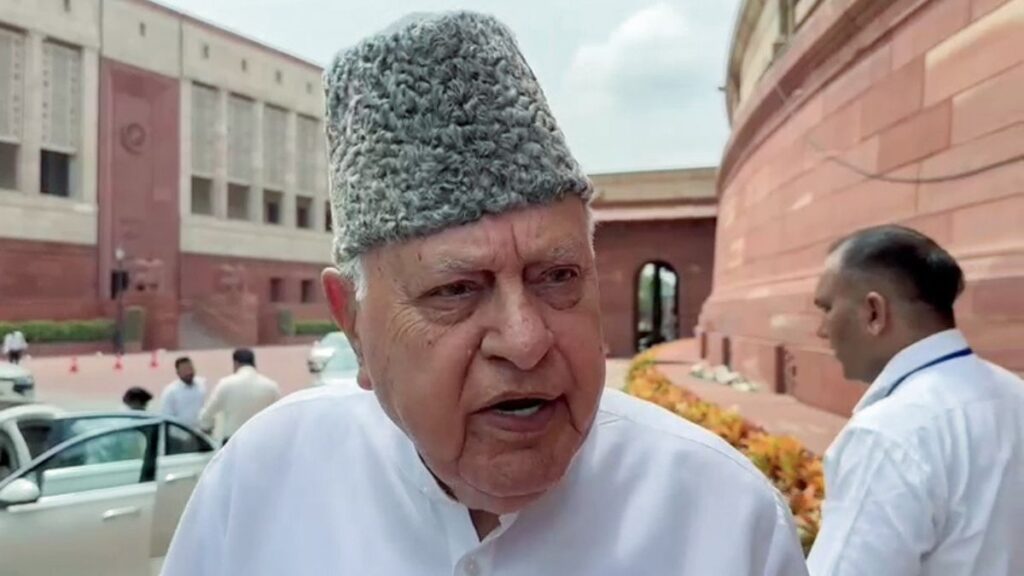‘If India Doesn’t Initiate Talks With Pak, Kashmir Will Become Gaza’
Dec 27, 2023 | Pratirodh Bureau
"If India does not initiate talks with Pakistan, Kashmir will become another Gaza,” the octogenarian Kashmiri leader said talking to reporters in New Delhi on Tuesday
Farooq Abdullah, former Jammu and Kashmir (J&K) chief minister and patron of the regional National Conference has said that if India does not initiate talks with Pakistan, Kashmir will become ‘Gaza’.
“Vajpayee ji had said that we can change friends, but we cannot change neighbours. Prime Minister Modi also said that war is not an option. Dialogue is the only way out for progress. If India does not initiate talks with Pakistan, Kashmir will become another Gaza,” the octogenarian leader said talking to reporters.
He also said that four years ago, in Chennai, the Home Minister had said that there is terrorism because of Article 370. “Now he has denied that statement after four years, in Parliament. See how much he lies,” Abdullah said.
He also touched upon the three civilians allegedly killed by the Army following the December 21 Poonch encounter in which four soldiers were killed.
“Our soldiers were killed and after that the Army went after innocent civilians. They were tortured and chilli powder was sprinkled on their wounds. They could not bear the torture. Eight locals were picked up. Three died and five are in the hospital, I am told. The brother of one of the three slain civilians is in the BSF. Today he is saying that after serving the country for 24 years, this is the reward?” Abdullah said.
Speaking about the transfer of a Brigadier following the civilian killings in Poonch, the patron of the National Conference asked, “What will happen by shifting them? I am told that the Army chief has also shifted the GoC-n-C of Northern Command. He has been sent to some academy in Dehradun. Compensation to victims will not help. It has to be enquired why these civilians were killed if we claim normalcy here.” He added, “This is not Gandhi’s India. Things have deteriorated to an extent where Hindus and Muslims think of each other as enemies.”
The Kashmir conflict is a territorial conflict over the Kashmir region, primarily between India and Pakistan, and also between China and India in the northeastern portion of the region. The conflict started after the partition of India in 1947 as both India and Pakistan claimed the entirety of the former princely state of Jammu and Kashmir.
It is the dispute over the region that escalated into three wars between India and Pakistan and several other armed skirmishes. India controls approximately 55% of the land area of the region that includes Jammu, the Kashmir Valley, most of Ladakh, the Siachen Glacier, and 70% of its population; Pakistan controls approximately 30% of the land area that includes Gilgit-Baltistan; and China controls the remaining 15% of the land area that includes the Aksai Chin region, the mostly uninhabited Trans-Karakoram Tract, and part of the Demchok sector.
After the partition of India and a rebellion in the western districts of the state, Pakistani tribal militias invaded Kashmir, leading the Hindu ruler of Jammu and Kashmir to join India. The resulting Indo-Pakistani War ended with a UN-mediated ceasefire along a line that was eventually named the Line of Control.
In 1962, China invaded and fought a war with India along the disputed Indo-Chinese border, including in Indian administered-Ladakh, marking their entry to the Kashmir conflict. In 1965, Pakistan attempted to infiltrate Indian-administered Kashmir to precipitate an insurgency there, resulting in another war fought by the two countries over the region. After further fighting during the war of 1971, the Simla Agreement formally established the Line of Control between the territories under Indian and Pakistani control. In 1999, an armed conflict between the two countries broke out again in Kargil with no effect on the status quo.
